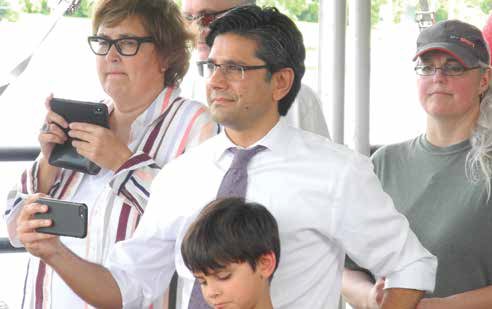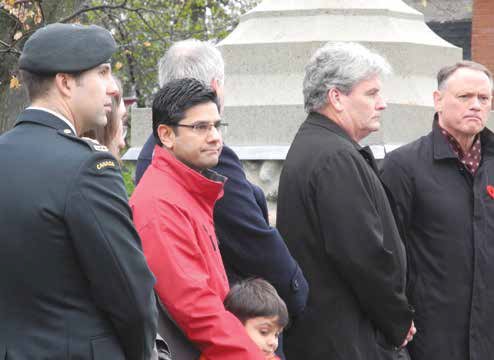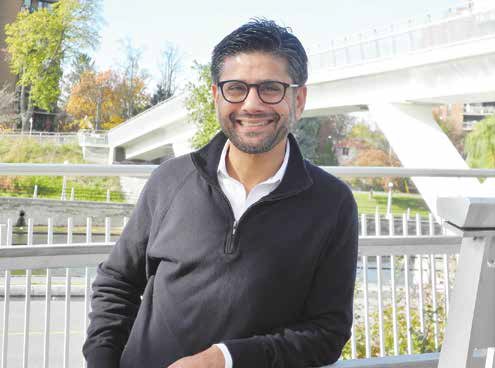The term “career politician” is not in all cases, a flattering one. But for those who are deeply involved in politics, who have entered the fray for all of the right reasons, and who have a clear aptitude for the role, the term career politician is not merely apt, it can, in fact, be a term of endearment.
During his prior term in provincial politics, as a backbench MLA and then as a Cabinet Minister, Yasir Naqvi did much to endear himself to his Ottawa Centre constituents, including his important efforts to secure political support and funding for the Flora Footbridge. Now, as Ottawa Centre’s newly-elected Member of Parliament, Naqvi returns to a life he knows and loves, re-energized by time away and eager to leave his mark on the federal political landscape. Despite new issues, challenges, and pitfalls at every turn, there is no other role Naqvi would rather have and no other place he would rather be.
The Mainstreeter sat down with Naqvi in late October for a wide-ranging interview. At that time, Naqvi was putting the finishing touches on his new constituency office and rounding out his political staff team. Busy times indeed, but Naqvi was happy for the chance to speak to the residents of Old Ottawa East, and offer up insights on his family background, his formative years, and the forces that have shaped his life and career in politics, a career of which he is rightfully proud.
THE MAINSTREETER: For those who do not know you, Yasir, can you tell us a little bit about your formative years in Pakistan and the very early days for you and your family here in Canada?
YASIR NAQVI: Certainly, but first, thank you for this opportunity. I’m very excited to take on the role of being a Member of Parliament for our community in Ottawa Centre.

Yasir Naqvi is pictured above taking a photo with his young son and is seen below with a backdrop of the much-loved Flora Footbridge. Photo by John Dance
My story of coming to Canada is a very typical story of many immigrants or refugees driven by the desire to build a better life. My parents are both lawyers by profession, now retired. Besides being involved in the legal profession in Pakistan, they were also involved in the pro-democracy movement in Pakistan when I was a child. There was no democracy – it was a military government in power, and my parents chose to be engaged to make sure that there would be strong democratic institutions in the country. My father was part of a movement to restore democracy in Pakistan. He led a pro-democracy march for which he was arrested and imprisoned for nine months as a political prisoner. I was 10 years old at that time, and that remains quite a vivid part of my memory and my upbringing. My mother led the fight to ensure that my father’s rights were protected when he was detained. She ran the family law practice so that there was food on the table. And I and my other siblings, along with my mother, often went to meet my father in prison.
All this to say that those values – in terms of engagement, upholding democracy, the right to vote – those very fundamental issues are key for me today. When my parents decided to immigrate to Canada, the decision was very much driven by the notion that they wanted their children to live in a free society, to be able to do whatever they wanted to do.
I was 15-years-old when I came to Canada, of high school age. And the very first card that we signed up for was at the local library because that was the equivalent of the internet back then. Through the library, we could engage in a new community and learn about our new country. The second card we signed up for was for the Liberal Party of Canada, and that was because we were finally living in a country where it was not a criminal offence to be part of a political party. And hence, the journey started and has stayed with me, and I’ve been a lifelong member of the Liberal Party, both provincially and federally. For me, it’s been a vehicle for engagement in any community that I’ve lived in, whether it’s part of a university community, or once I came to Ottawa. I believe I’ve picked up from my parents that passion for public service that has led me to run for office provincially and federally.
THE MAINSTREETER: You were elected as a member of the provincial legislature at Queen’s Park and served as an MLA for 10 or 11 years. And then you finally got a break from politics. So, why did you decide to run again for political office, and this time at the federal level?
YASIR NAQVI: That’s a very good question. The big reason I decided to run again is because of the moment in time that we find ourselves. The pandemic has changed a lot. And there’s a great opportunity for us to rebuild in an inclusive manner. So when the opportunity came to seek public office again, that’s what compelled me to want to leverage my experience from being a provincial member as we do the rebuilding – knowing our community quite well, having those community connections, and being able to be an effective voice for the community. This work can impact us right here in the downtown core of Ottawa, but also in the country writ large, so that’s what motivated me to come back into public office. I’m thrilled beyond imagination that I’m doing that because there’s some really important work that needs to happen as we escape this pandemic and imagine the kind of society we have an opportunity to build. If I can play a small part in that, I will be thrilled by the opportunity the community has given me.
THE MAINSTREETER: What are the lessons you learned in your 10 or more years at Queen’s Park? What were the key takeaways, skill sets, and experiences from your tenure as an MLA that you can now bring to the federal office?
YASIR NAQVI: There are three things I would highlight. One is how, as a member of the provincial legislature or as a federal MP, do you affect change on behalf of your community? In other words, how do you become a community champion? How do you change outcomes on important issues – whether it’s getting funding to build a bridge over the Canal, or funding to get a school built in your community, or changing laws that would reduce speed limits on residential streets in urban neighbourhoods? There’s an art that comes with being an elected representative, working with other elected representatives, with members of cabinet, and effecting that change. I bring that experience. I think I did that quite effectively when I was a member of the provincial assembly.
The second quite relevant thing I learned as a minister is the entire machinery of government. Government is complex in our system. There’s many layers to it, and there are quite a few different levers from bureaucracy to political decision-making. How can you develop good public policy aligned with good politics to effect change? Again, there’s a skill and an art that goes into it. One learns by being part of this system, and as a senior cabinet minister over the years at Queen’s Park, I was instrumental in effecting some good public policy changes.
But the most paramount lesson I’ve learned is that in governments generally, and it doesn’t matter which political stripe, there tends to be a notion of defending the status quo, because that’s where the comfort level is. And one of the things I learned is how you go about challenging the status quo. I used to remind bureaucrats all the time that no politician knocks on 1000s of doors during a campaign and says: “Elect me and I will defend the status quo.” We all want change. So let’s work on making that change. It’s challenging, and it’s difficult, and that’s where the hard work comes. The notion of challenging the status quo is, I think, the biggest overarching lesson and experience that I learned over the last 11 years, and the one that I’m hoping to exercise at the federal level.
THE MAINSTREETER: Speaking to specifics, when you were a provincial MPP and a minister, what specific changes did you accomplish, and now, as an MP and maybe as a future minister, what specifically do you hope to achieve federally?
YASIR NAQVI: I’ll give you one example provincially – it was a change that I drove working not by myself because there’s a whole machine that’s part of it, but a change about which the initial response was “no, we cannot do that.” It concerned banning the whole exercise of carding, a practice that the police in Ontario were engaging in, especially in major urban centres like Ottawa and Toronto where, primarily, black men, indigenous men, and brown men were being stopped by the police for doing nothing wrong and having their personal information collected. Clearly, this practice was a violation of basic Charter rights, but it was all being done from the perspective of public safety. And Ontario was, and still is, the first jurisdiction in all of North America to bring in a set of rules, enforced by law, to say you cannot do that. I cannot tell you how difficult it was to change a practice that became rooted over decades and decades, but it was victimizing innocent people and having a real negative impact. And we managed to do this before the great reckoning that we saw two years ago with the murder of George Floyd. Ontario, as a result, is ahead of the curve. There’s still more work to be done to ban carding, but this is an example of where you can make a monumental change in the system, even though the system says you cannot do that. I want to take that kind of bold thinking to the federal level and help get over some of that hesitancy. I want to make sure that we are making decisions based on good evidence and rooted in good public policy.
There are three specific things that I spoke about in the election campaign that I’m keen to pursue. First, rebuilding has to be inclusive, which means that we need to bring everybody along for the process. Child care, for example, is a big piece from an economic policy perspective and a key central tenet of the Liberal government’s re-election plan.
Number two is bold and ambitious action on climate change. I will tell you that the number one issue I heard in the community in Ottawa Centre when I was knocking on doors is that people want bold change. So there’s a fair bit of work that needs to be done on that. And the last one is fighting racial injustice. There are still issues in federal law enforcement when it comes to racial profiling and anti-indigenous practices that I want to leverage my provincial experience to work to effect change.
THE MAINSTREETER: At Queen’s Park, you were first a backbencher MLA, and then you became a Cabinet Minister. So you have experienced both of those very different roles. You enter federal politics as a backbencher once again. Do you think your role in the Trudeau government outside of Cabinet will limit your ability to achieve what you hope to get done?
YASIR NAQVI: That’s a good question – but that should not impair or hinder my effectiveness as a Member of Parliament because I take my marching orders from the members of my community who have elected me. I’m their voice at the House of Commons. That’s the central tenet of our system.
I think I tabled about 10 different private member’s bills when I was a backbencher, and you cannot do that as a Cabinet Minister, and all but two of them became laws in Ontario. These were substantive pieces of legislation dealing with the Highway Traffic Act, and with creating an independent public health agency here in the City of Ottawa, which we’ve seen the benefits of today during this COVID crisis. I created a piece of legislation that prohibited frivolous lawsuits against community activist members, and I was able to see them get incorporated into law. Because again, I worked with the government, with members from all political parties. And I did my homework, my research and made sure that there were good public policy ideas that were brought forward on behalf of the community.
The other thing I will tell you is that all of the ideas behind those bills came from our community. I’ll never forget the bill that became law allowing for individuals, primarily women again, unfortunately, who are victims of domestic violence, to terminate their leases so that they could escape from their perpetrators. That bill came to be because a young woman from our community came to me as her MPP and told me her story. I said to her, let’s do some research and let’s write a bill together, and we did, and that became law in Ontario.
I will rely on that same work ethic and my knowledge of how government operates. And I will work with anyone and everyone. I don’t get into this myopic view of I’m a Liberal so I shall only work with Liberals. The beautiful thing about the legislature is that you’ve got members who bring their dreams and aspirations and ideas from their respective communities. And the key here is to find that common ground and work with individuals with common sets of values to get things done, and that’s what I plan to do.
THE MAINSTREETER: You have used the words engagement, inclusivity, and diversity, all of which are fundamental to the democratic process and to the development of sound public policy. Here in Ottawa, we’ve just gone through an Official Plan (OP) process which is going to have a profound impact on the development of this city, of our community, and of every neighbourhood in Ottawa. Contrary to official claims, the development of the OP has been marked by a woeful lack of meaningful prior public consultation. With respect to what you want to achieve in federal politics, what are your thoughts or strategies when it comes to the use of public consultation?
YASIR NAQVI: When we think of public consultation, we always think of one way of doing it, which is the one way we have always known – call a town hall meeting and have people gather in a room and then talk about it. I think that the model is becoming antiquated because, first of all, everybody lives really busy lives. People have other obligations and not everybody can come to the local community centre at 7pm to participate. So we usually start to see the same faces and therefore you tend to hear the same voices.

During his years in provincial politics, Naqvi was a well-known figure in Old Ottawa East, seen here at the Brantwood Gates cenotaph. Photo by John Dance
I think what’s incumbent upon us public officials is to find other ways of engaging the community. Town halls are important. Social media, I think, is a really useful instrument, a tool for us to talk to people by engaging in online forums. I think the pandemic has shown that by using zoom and video conferencing methods you hear from more people because it’s more convenient. My favourite method that I have used quite effectively in the past is to just go knock on doors and have conversations. I learned about the idea for a footbridge over the Rideau Canal from John Dance when I knocked on his door. John told me at his doorstep that there’s a 100-year-old idea to build a bridge, and we engaged in a few more conversations. He shared some documents with me. I’m not taking all the credit – the credit goes to the community – but here we are – and it got done. I plan to use all those different methods.
Will we be able to get a consensus? Absolutely not. Because there’s no such thing. Are we going to be able to speak to every single person – likely not. But we can get a broad sense of understanding and exchange of ideas, those who agree and disagree so that there is respect of points of views. That’s just my nature because I like to hear many voices before a decision is made. I’m going to make sure that before major decisions are made, the community has an opportunity to express their point of view.
THE MAINSTREETER: You have stated that life/work balance is very important you. How do politicians manage to meet the day-to-day challenges of being an MP as well as a father to two young children?
YASIR NAQVI: They don’t do it. None of us do this by ourselves. We do it with the support of some incredible teams of really good people who help an elected representative, whether it’s our city councillors, our provincial member, or our federal representatives. That’s how we get it done. There’s only 24 hours in every day.
All of the elected representatives that I know in Ottawa, they’re motivated individuals who are driven by the passion of building better communities. That’s why people put their name on the ballot. It’s all about the work we do.
I’m wrapping this up and finishing with the point that we started with – namely, that I feel myself extremely fortunate to be a Canadian. That one decision that my parents made to come to Canada when we were young – that changed our lives, for the better. And so I do this as a sense of duty because this is my opportunity to hopefully help to create a better life for others who live in our community.








